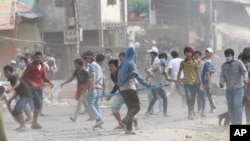On January 17 last year, representatives from two dozen of the world’s largest fashion brands wrote to the Cambodian government demanding that it investigate the killings by security forces of at least five garment workers during violent demonstrations two weeks earlier. But one year later, it seems little progress has been made.
When the Cambodian authorities shot dead at least five garment workers during violent demonstrations just over a year ago, the killings made international headlines. The workers were protesting in favor of an increase to the minimum wage, which at the time was around $100 a month, and came during a period of post-election political deadlock.
At the time more than two dozen international brands which source clothing from Cambodian factories spoke up. They include brands such as H&M, adidas, PUMA and Levi-Strauss. In a letter to Prime Minister Hun Sen, the brands insisted on a number of measures, including that the government investigate the killings and punish those responsible.
One year later, the promised investigation into the actions of the security forces looks to have disappeared inside the country’s pliant judiciary.
A Ministry of Interior spokesman told VOA that the government had lodged its investigation report with the courts nearly a year ago. Despite repeated efforts, VOA was unable to speak to the relevant authority at the court to determine what has happened to it.
Dave Welsh, who heads the Cambodia office of the Solidarity Center, a non-profit affiliated with the U.S.-based labor movement, believes there has been no sincere effort to hold anyone accountable.
“But not only have there been no investigations - there’s been complete impunity - but there’s also been no compensation. So you have the families of the deceased and the families of the injured. The families of the deceased have lost basically economic security for the foreseeable future. The families of the injured and the injured themselves have absorbed enormous healthcare costs,” said Welsh.
Garment manufacturing is central to Cambodia’s economy. The sector is not only the largest employer, with 600,000 workers; it is also the country’s key foreign exchange earner, worth more than $5 billion in exports, mainly to the United States and the European Union.
VOA contacted four of the brands that signed the letter: Germany’s PUMA and adidas, U.S. brand Levi-Strauss and Sweden’s H&M.
H&M declined to comment, while PUMA said it would only communicate in conjunction with other brands on the issue.
A spokesperson for Levi-Strauss told VOA the U.S. multinational was continuing to engage the Cambodian government on the need for an investigation, while a spokesperson for adidas said the company had pursued the need for an investigation and compensation with Cambodia’s Ministry of Justice.
The adidas spokesperson told VOA by email: “We have been in regular communication with the Minister up to the end of last year. We are now pending a response from the Court and the Prosecutor.”
Germany’s ambassador to Phnom Penh, Joachim Baron von Marschall, said his embassy has not only discussed the investigation with German brands on a regular basis but has also taken part in talks on the issue with other EU ambassadors and the government. Producing concrete results in a timely manner, he said, is the best way for Phnom Penh to prove the sincerity of its commitment.
Leading opposition MP Mu Sochua, who has long championed the rights of garment workers, said she will meet with families of the victims in the coming weeks to see whether they wish to file a complaint about the investigation with parliament.
“If it is closed, then it should be made public - the results should be made public. If it is still an ongoing case, we should know what the investigating judge is doing. At least what he is doing, not this total silence,” said Sochua.
Sochua also wants brands to exert greater pressure on the government so that the stance they took in last year’s letter is mirrored by actions that uphold their reputations.
She said the lack of progress to date is little surprise in a country where the judiciary is quick to try the government’s perceived opponents while ignoring breaches by the powerful.
“But what I am trying to work in is to work toward some form of reform in the judiciary system, and some kind of commitment. Therefore we must continue to speak for and on behalf of the victims and on behalf of the nation as members of parliament,” Sochua said.
Dave Welsh from the Solidarity Center points out that the brands’ demand for the prosecution of those responsible was just one component of their letter, and that other elements remain unresolved.
“And on all these other issues - the shootings, the deaths, the convictions, wrongful convictions in my mind, of 23 activists, massive terminations, lawsuits against every independent trade union leader in the country that are still ongoing - there’s been no resolution. All these things are still outstanding,” said Welsh.
All of these failures, said Welsh, should be seen against a backdrop of ongoing intimidation against Cambodia’s union movement.







